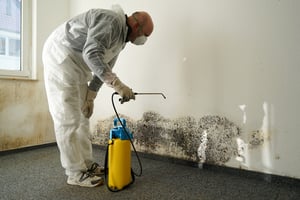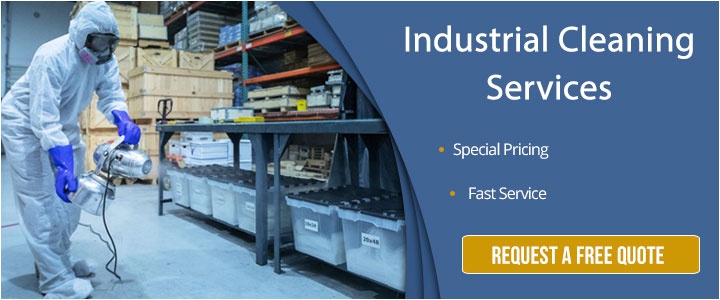A clean industrial facility is a bit of an oxymoron. After all, between manufacturing processes, shipment deliveries and distribution processes, facilities are a hub of activity.
Keeping a working facility clean can be difficult, but is imperative to avoid disrupting the efficiency and safety of a workplace.
Here are 8 industrial cleaning tips that will help you effectively maintain your facility to ensure safety and improve productivity:
- Remove potential fire hazards.
- Label and store cleaning chemicals properly.
- Know when you need industrial cleaning vs. commercial cleaning.
- Get specialized services for your facility.
- Remediate, not remove.
- Consider your cleaning materials.
- Creating a cleaning checklist.
- Partner with an experienced industrial cleaning company.
Remove Potential Fire Hazards
If your workplace is cluttered, you have a potential fire hazard on your hands. Stockpiles of paper, boxes and other materials found in an office space or on a manufacturing floor can cause a small fire to spread rapidly.
materials found in an office space or on a manufacturing floor can cause a small fire to spread rapidly.
It’s important to ensure during routine cleaning that these items are removed from high-traffic areas and stairs in an office or facility to make sure they do not impede workers from evacuating.
Other common potential fire hazards in industrial settings include unsecured chemicals and combustible dust. We’ll explore appropriate storage options in our next section, but it’s generally important to ensure all chemicals are properly contained and stored in the proper areas of your warehouse.
Combustible dust is often found in facilities like chemical plants, woodworking warehouses, and metal and food processing plants. Combustible dust becomes an explosion hazard when it can burn rapidly in a finely divided form. If the dust suspends in the air at the right concentration, it can explode under certain conditions.
If your facility regularly generates combustible dust, it’s imperative to have a routine cleaning process in place that addresses it through preventative maintenance.
Label And Store Cleaning Chemicals Properly
Choosing the right hazardous waste storage container is not only a matter of safety, it’s the law. OSHA and the U.S. Department of Transportation offer a long list of requirements for the different classifications of hazardous liquids and substances.
It’s also important not to overlook the proper storage of cleaning materials. Flammable and combustible cleaning chemicals should be kept in a chemical storage cabinet or other safe areas as required.
Employees must always label containers filled with cleaning agents as well to avoid accidents. One cleaning agent mixed with another - even just a trace - can cause a chemical reaction or unintended consequences. Here’s one example that occurred in a commercial space.
In 2014, a fast food employee used a container found in the sink to store vanilla syrup. What that employee did not know was that plastic containers had previously been used to store an industrial cleaner. Three customers, including a 7-year-old boy, suffered burns to their throats after ordering contaminated milkshakes.
Vigilance is key when creating an industrial cleaning plan, which should include processes for labeling and storing cleaning chemicals.
Know When You Need Industrial Cleaning Vs. Commercial Cleaning
Industrial cleaning services are often used in industrial plants and manufacturing facilities. However, this specialized type of cleaning is also appropriate for other types of setting like factories, warehouses, distribution centers, power plants, hospitals and pharmaceutical production facilities.
specialized type of cleaning is also appropriate for other types of setting like factories, warehouses, distribution centers, power plants, hospitals and pharmaceutical production facilities.
While many of the above facilities use a commercial cleaning company as well, it’s important to note that industrial cleaning services and commercial cleaning services ARE NOT the same. While industrial cleaners offer similar services, such as deep cleaning, disinfection and pressure washing, they also specialize in cleaning manufacturing equipment and hazardous environments.
Industrial cleaning services can often accommodate factory schedules. Industrial plants may run operations around the clock, and shutting down operations is costly. Specialized cleaning services that serve plants, hospitals and warehouses have the tools necessary to quickly and thoroughly clean a space during production downtime.
Get Specialized Services For Your Facility
There’s a distinct difference in how a professional cleaning company will service your facility based on the equipment inside.
For example, industrial tank cleaning services should be a part of any routine cleaning plan for any facility that has a tank onsite. Industrial tanks hold various types of liquids and should be cleaned regularly to prevent the growth of bacteria and fungi inside. The accumulation of sludge and other build-ups can alter the effectiveness of the chemical or substance inside, creating a costly problem for your business.
During this specialized process, tank cleaning experts will typically vent the tank to remove any dangerous vapors. They will then clean the interior of the tank using high-pressure water. Some cleaning experts may offer additional services like repairing damaged interior walls or applying protective coatings.
Another example of a specialized cleaning service is storm drain cleaning. Storm drains do not only collect stormwater, they collect runoff like gunky oils, chemicals and solid materials as well. Trained crews experienced in storm drain cleaning ensures these drains stay clear and work as they should.
Remediate, Not Remove
A significant sector of the industrial cleaning industry focuses on mold cleanup. If your company finds itself in need of these services, it’s important to seek help from mold remediation companies.
these services, it’s important to seek help from mold remediation companies.
While a company may promise to remove the mold at your facility, you should instead focus on remediation or getting to the root of the problem. Mold can never be completely removed because one spore left behind will replicate if the growth conditions remain, and in factories where moisture is often found, the environment is ripe for mold growth.
Mold remediation is a multi-step plan to make your space less hospitable to mold, keeping it to the point where periodic cleanings keep it managed in a building. The best mold remediation companies will:
- Perform a mold inspection that also identifies and repairs the source of the problem
- Dehumidify the affected areas
- Contain the area to prevent mold spores from spreading
- Remove any materials not part of the structure that have been affected by mold
- Treat the mold with an agent that lifts it off any structural surfaces
- Vacuum the area with a HEPA vacuum that captures the mold
- Apply an antimicrobial agent, which offers a final protective coat
Mold remediation companies should also test and identify other areas of the property where mold growth may not be visible yet, but where the conditions are right for mold to develop.
Consider Your Cleaning Materials
Different cleaners may be necessary to remedy particular cleaning needs found at your facility. A cleaning project may include a variety of soaps, disinfectants, polishes, descalers, solvents and heavy-duty detergents.
With any cleaning project, ensure you have the appropriate safety eyewear, gloves and clothing on-hand if the project is being handled by internal staff.
Suppose you’re hiring an industrial cleaning company. In that case, a qualified specialist should be able to provide you with a detailed list of cleaning chemicals and products that it plans to use at your facility.
While inevitably, some cleaning agents may be more hazardous than others, it’s always a good idea to use biodegradable cleaning agents when possible. It’s critical not to contaminate the area when cleaning it, creating a whole new problem that must be solved.
Create A Cleaning Checklist
A great way to stay on top of a clean facility is to create a checklist or cleaning plan that is followed on a regular basis. Checklists can vary from daily to monthly and annually. Daily checklists may include directions to outgoing crews at the end of a shift and feature simple tasks like emptying trash cans or wiping down surfaces with provided cleaners.
More extensive checklists may revolve around industry standards like how how often industrial water tanks should undergo cleaning (at least twice a year). Check with OSHA or organizations like IDR Environmental Services that specialize in your industry for requirements that pertain to your equipment.
Partner With An Experienced Industrial Cleaning Company
Ensuring that you have a safe and clean workplace can be an extensive process. An experienced industrial cleaning company can ensure you meet industry standards while keeping your people safe.
The top industrial cleaning companies offer:
- Specialized services that are tailored toward industries like factories, warehouses, distribution centers, manufacturing facilities, power plants, medical facilities and pharmaceutical production facilities
- A walk-through program that is consultative in nature and involves the cleaning company touring your facility to discuss your concerns and identify any problem areas along the way
- Flexible scheduling around your production schedule
- Emergency response capabilities should you need specialized cleaning services quickly
Look for a licensed, bonded, insured company, especially if your facility deals with hazardous chemicals and dangerous industrial equipment.
Finally, the industrial cleaning company you work with should be specialized and certified in managing hazardous waste if relevant to the work conducted inside your facility. The perfect cleaning service should be able to clean on site and help you safely and legally transport that hazardous waste and dispose of it safely.


Comment